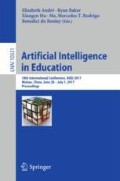Abstract
Attention is key to effective learning, but mind wandering, a phenomenon in which attention shifts from task-related processing to task-unrelated thoughts, is pervasive across learning tasks. Therefore, intelligent learning environments should benefit from mechanisms to detect and respond to attentional lapses, such as mind wandering. As a step in this direction, we report the development and validation of the first student-independent facial feature-based mind wandering detector. We collected training data in a lab study where participants self-reported when they caught themselves mind wandering over the course of completing a 32.5 min narrative film comprehension task. We used computer vision techniques to extract facial features and bodily movements from videos. Using supervised learning methods, we were able to detect a mind wandering with an F1 score of .390, which reflected a 31% improvement over a chance model. We discuss how our mind wandering detector can be used to adapt the learning experience, particularly for online learning contexts.
Access this chapter
Tax calculation will be finalised at checkout
Purchases are for personal use only
Notes
- 1.
A preliminary two-page version of this paper was presented as an Extended Abstract Poster at the 24th Conference on User Modeling, Adaptation and Personalization. The present paper describes the methods in more detail, updated results, and expanded analyses not included in the preliminary paper.
References
D’Mello, S.K.: Giving eyesight to the blind: towards attention-aware AIED. Int. J. Artif. Intell. Educ. 26(2), 645–659 (2016)
Killingsworth, M.A., Gilbert, D.T.: A wandering mind is an unhappy mind. Science 330, 932 (2010)
Bixler, R., D’Mello, S.: Toward fully automated person-independent detection of mind wandering. In: Dimitrova, V., Kuflik, T., Chin, D., Ricci, F., Dolog, P., Houben, G.-J. (eds.) UMAP 2014. LNCS, vol. 8538, pp. 37–48. Springer, Cham (2014). doi:10.1007/978-3-319-08786-3_4
Kopp, K., Mills, C., D’Mello, S.K.: Mind wandering during film comprehension: the role of prior knowledge and situational interest. Psychon. Bull. Rev. 23, 842–848 (2015)
Franklin, M.S., Smallwood, J., Schooler, J.W.: Catching the mind in flight: using behavioral indices to detect mindless reading in real time. Psychon. Bull. Rev. 18, 992–997 (2011)
Szpunar, K.K., Moulton, S.T., Schacter, D.L.: Mind wandering and education: from the classroom to online learning. Front. Psychol. 4, 495 (2013)
Randall, J.G., Oswald, F.L., Beier, M.E.: Mind-wandering, cognition, and performance: a theory-driven meta-analysis of attention regulation. Psychol. Bull. 140, 1411 (2014)
Bixler, R., D’Mello, S.: Automatic gaze-based detection of mind wandering with metacognitive awareness. In: Ricci, F., Bontcheva, K., Conlan, O., Lawless, S. (eds.) UMAP 2015. LNCS, vol. 9146, pp. 31–43. Springer, Cham (2015). doi:10.1007/978-3-319-20267-9_3
Blanchard, N., Bixler, R., Joyce, T., D’Mello, S.: Automated physiological-based detection of mind wandering during learning. In: Trausan-Matu, S., Boyer, K.E., Crosby, M., Panourgia, K. (eds.) ITS 2014. LNCS, vol. 8474, pp. 55–60. Springer, Cham (2014). doi:10.1007/978-3-319-07221-0_7
Pham, P., Wang, J.: AttentiveLearner: improving mobile MOOC learning via implicit heart rate tracking. In: Conati, C., Heffernan, N., Mitrovic, A., Verdejo, M.F. (eds.) AIED 2015. LNCS, vol. 9112, pp. 367–376. Springer, Cham (2015). doi:10.1007/978-3-319-19773-9_37
Mills, C., Bixler, R., Wang, X., D’Mello, S.K.: Automatic gaze-based detection of mind wandering during film viewing. In: Proceedings of the 9th International Conference on Educational Data Mining. International Educational Data Mining Society, Raleigh (2016)
Zeng, Z., Pantic, M., Roisman, G.I., Huang, T.S.: A survey of affect recognition methods: audio, visual, and spontaneous expressions. IEEE Trans. Pattern Anal. Mach. Intell. 31, 39–58 (2009)
Faber, M., Bixler, R., D’Mello, S.K.: An automated behavioral measure of mind wandering during computerized reading. Behav. Res. Methods 1–17 (2017)
Reichle, E.D., Reineberg, A.E., Schooler, J.W.: Eye movements during mindless reading. Psychol. Sci. 21, 1300–1310 (2010)
Littlewort, G., Whitehill, J., Wu, T., Fasel, I., Frank, M., Movellan, J., Bartlett, M.: The computer expression recognition toolbox (CERT). In: 2011 IEEE International Conference on Automatic Face & Gesture Recognition and Workshops (FG 2011), pp. 298–305. IEEE (2011)
Ekman, P., Friesen, W.V.: Facial action coding system (1977)
Westlund, J.K., D’Mello, S.K., Olney, A.M.: Motion tracker: camera-based monitoring of bodily movements using motion silhouettes. PLoS ONE 10, e0130293 (2015)
Dixon, W.J., Yuen, K.K.: Trimming and winsorization: a review. Statistische Hefte 15, 157–170 (1974)
Allison, P.D.: Multiple Regression: A Primer. Pine Forge Press, Thousand Oaks (1999)
Kononenko, I.: Estimating attributes: analysis and extensions of RELIEF. In: Bergadano, F., Raedt, L. (eds.) ECML 1994. LNCS, vol. 784, pp. 171–182. Springer, Heidelberg (1994). doi:10.1007/3-540-57868-4_57
Holmes, G., Donkin, A., Witten, I.H.: Weka: a machine learning workbench. In: Proceedings of the 1994 Second Australian and New Zealand Conference on Intelligent Information Systems, pp. 357–361. IEEE (1994)
Platt, J., et al.: Sequential minimal optimization: a fast algorithm for training support vector machines (1998)
Chawla, N.V., Bowyer, K.W., Hall, L.O., Kegelmeyer, W.P.: SMOTE: synthetic minority over-sampling technique. J. Artif. Intell. Res. 16, 321–357 (2002)
Cohen, J.: Statistical Power Analysis for the Behavioral Sciences, 2nd edn. Lawrence Erlbaum, Hillsdale (1988)
Szpunar, K.K., Khan, N.Y., Schacter, D.L.: Interpolated memory tests reduce mind wandering and improve learning of online lectures. Proc. Natl. Acad. Sci. 110, 6313–6317 (2013)
Moss, J., Schunn, C.D., Schneider, W., McNamara, D.S.: The nature of mind wandering during reading varies with the cognitive control demands of the reading strategy. Brain Res. 1539, 48–60 (2013)
Acknowledgements
This research was supported by the National Science Foundation (NSF) (DRL 1235958 and IIS 1523091). Any opinions, findings and conclusions, or recommendations expressed in this paper are those of the authors and do not necessarily reflect the views of the NSF.
Author information
Authors and Affiliations
Corresponding authors
Editor information
Editors and Affiliations
Rights and permissions
Copyright information
© 2017 Springer International Publishing AG
About this paper
Cite this paper
Stewart, A., Bosch, N., Chen, H., Donnelly, P., D’Mello, S. (2017). Face Forward: Detecting Mind Wandering from Video During Narrative Film Comprehension. In: André, E., Baker, R., Hu, X., Rodrigo, M., du Boulay, B. (eds) Artificial Intelligence in Education. AIED 2017. Lecture Notes in Computer Science(), vol 10331. Springer, Cham. https://doi.org/10.1007/978-3-319-61425-0_30
Download citation
DOI: https://doi.org/10.1007/978-3-319-61425-0_30
Published:
Publisher Name: Springer, Cham
Print ISBN: 978-3-319-61424-3
Online ISBN: 978-3-319-61425-0
eBook Packages: Computer ScienceComputer Science (R0)

